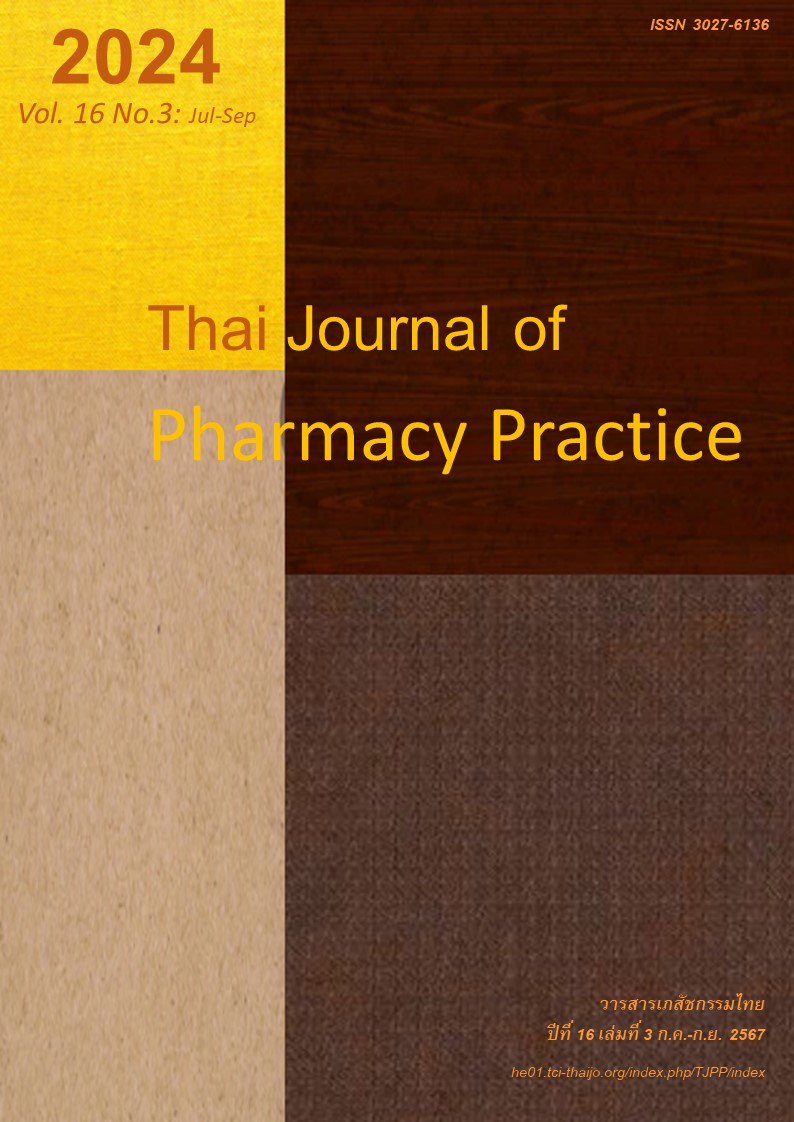Factors Affecting Sleep Quality in Patients Using Cannabis Oil for Insomnia at a Thai Traditional Medical Cannabis Clinic
Main Article Content
Abstract
Objective: To study sleep quality and its affecting factors in patients using cannabis oil to treat insomnia at a Thai traditional medical cannabis clinic. Methods: The research was an analytical cross-sectional study. The subjects consisted of 279 patients who used cannabis oil for insomnia at the Thai traditional medical cannabis clinic of Thai Traditional Health Promotion Center under the Department Thai Traditional and Alternative Medicine. The study measured sleep quality using the Thai version of the Pittsburgh Sleep Quality Index. The studied factors included background information of the patients and stress as measured by the Suanprung Stress Test. Results: 53.0% of the subjects had poor sleep quality, while 47.0% had good sleep quality. Factors significantly affecting poor sleep quality with P<0.05 were educational levels bachelor's degree or higher (OR=1.93, 95%CI=1.19-3.12, compared to those at below bachelor's degree), being paid workers, business owners, commerce and housekeepers/retirees (OR=4.64, 95%CI=1.58-13.61; OR=4.67, 95%CI=1.21-18.04; OR=7.40, 95%CI=2.34-23.38; OR=3.70, 95%CI=1.17-11.74, respectively, compared with civil servants/those working in state enterprises), those not able to specify specific working hours and those working more than 8 hours in a day (OR=3.16, 95%CI=1.47-6.77; OR=2.99, 95%CI= 1.45-6.14, respectively, compared to those working less than or equal to 8 hours a day), those with chronic diseases (OR=2.50, 95%CI=1.54-4.07), those regularly taking other medications (OR=2.27, 95%CI=1.39-3.72), those taking sedative and sedation -inducing drugs (OR=11.47, 95%CI=1.47-89.47), those with moderate and high levels of stress (OR=2.16, 95%CI=1.30-3.58, compared with those with mild stress) and duration of cannabis oil use at 366-730 days and greater than or equal to 731 days (OR=1.85, 95%CI=1.14-3.10; OR=3.64, 95%CI=1.59. -8.29, respectively, compared to those with less than or equal to 365 days of cannabis use). Conclusion: Hospitals can apply factors found to affect sleep quality of patients who use cannabis oil to take care of them at Thai traditional medical cannabis clinics.
Article Details

This work is licensed under a Creative Commons Attribution-NonCommercial-NoDerivatives 4.0 International License.
ผลการวิจัยและความคิดเห็นที่ปรากฏในบทความถือเป็นความคิดเห็นและอยู่ในความรับผิดชอบของผู้นิพนธ์ มิใช่ความเห็นหรือความรับผิดชอบของกองบรรณาธิการ หรือคณะเภสัชศาสตร์ มหาวิทยาลัยสงขลานครินทร์ ทั้งนี้ไม่รวมความผิดพลาดอันเกิดจากการพิมพ์ บทความที่ได้รับการเผยแพร่โดยวารสารเภสัชกรรมไทยถือเป็นสิทธิ์ของวารสารฯ
References
Kitkawee P. Thai people "can't sleep" [online].2019 [cited Dec 10, 2022]. Available from: www.hfocus.org/ content/2019/03/16978.
Chaiarj S, Panya P. Insomnia and related factors. Thai Journal of Nursing Council 2005; 20: 1-12.
Na Wichian S. Sleep quality of older people in the community. Thai Journal of Nursing Council 2021; 36: 18-31.
Tipratchadaporn S, Srita J, Pomchaiya P, Boonyawan S, Silarak K. Benefit and safety of Suk Sai-yad traditional medicine recipe in patients with insomnia. Journal of Thai Traditional and Alternative Medicine, 2021; 19: 317-29.
MacCallum CA, Russo EB. Practical considerations in medical cannabis administration and dosing. Eur J Intern Med 2018; 49: 12-9.
Whiting PF, Wolff RF, Deshpande S, Di Nisio M, Duffy S, Hernandez AV, et al. Cannabinoids for medical use: a systematic review and meta-analysis. JAMA 2015; 313: 2456-73.
Health Administration Division. National overview report of C-MOPH program [online]. 2019 [cited Dec 9, 2021]. Available from: ccd.moph.go.th/report/web/.
Department of Thai Traditional and Alternative Medi- cine. Annual academic conference on Thai traditional medicine folk medicine and the 17th national alterna- tive medicine [online]. 2020 [cited Dec 9, 2021]. Available from: www.dtam.moph.go.th/E-Book/acade mic-meeting-172563/index.html#p=122.
Kessomboon P. Appropriate dosage of cannabis for the treatment of disease [online]. 2020 [cited Dec 9, 2021]. Available from: bit.ly/3uWtKSY.
Announcement of the National Drug System Deve- lopment Committee on national essential medicines list on herbs. 2564. Royal Gazette No. 139, Part 41 (Feb 18, 2022).
Faul F, Erdfelder E, Lang A-G, Buchner A. G*Power 3: A flexible statistical power analysis program for the social, behavioral, and biomedical sciences. Behav Res Methods 2007; 39: 175-91.
Suanprung Hospital. Suanprung Stress Test: SPST-20 [online]. 2019 [cited Dec 9, 2021]. Available from: e-learning.srru.ac.th/mod/resource/view.php?id=244 41.
Methipisit T, Mungthin M, Saengwanitch S, Ruang kana P, Chinwarun Y, Ruangkanchanasetr P, et al. The development of sleep questionnaires Thai version (ESS, SA-SDQ, and PSQI): linguistic valida- tion, reliability analysis and cut-off level to determine sleep related problems in Thai population. J Med Assoc Thai 2016; 99: 893-903.
Kaul M, Zee PC, Sahni AS. Effects of cannabinoids on sleep and their therapeutic potential for sleep disorders. Neurotherapeutics. 2021; 18: 217-27.
Lichstein KL, Taylor DJ, McCrae CS, Ruiter ME. Insomnia: Epidemiology and risk factors. In Principles and practice of sleep medicine: Fifth Edition. Elsevier Inc. 2010. p. 827-37 doi: 10.1016/B978-1-4160-6645-3.00076-1
Sivertsen B, Krokstad S, Overland S, Mykletun A. The epidemiology of insomnia: Associations with physical and mental health: The HUNT-2 study. J Psychosom Res 2009; 67: 109-16.
Kerdcharoen N, Wisitpongaree C, Padermpornrom yen C, Jaroennophakunsri C, Sittisak N, Imeuarbpa thom N, et al. Work factors related to sleep quality among professional nurses in the inpatient depart- ment. Vajira Medical Journal: Journal of Urban Medicine 2020: 64: 41-58.
Supamanee T, Kunaviktikul W, Keitlertnapha P. Nurses’ extended work hours and nurse outcomes in community hospitals. Nursing Journal 2014; 41 (supplement): 48-58.


